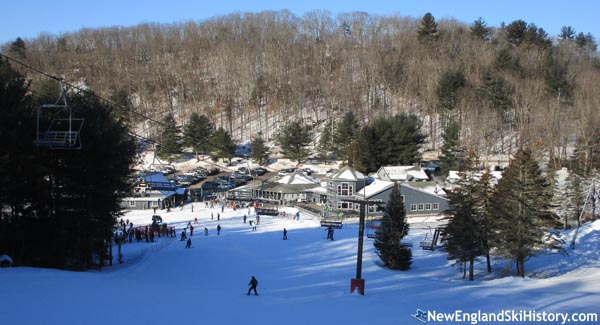
|
|
Located northwest of Hartford on Ratlum Mountain, Ski Sundown is a popular regional facility for skiers of all abilities.
Satan's Ridge
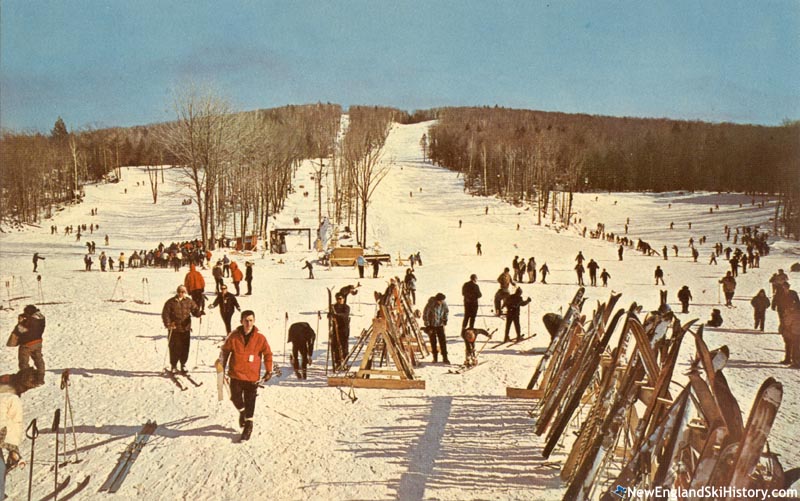
The base area |
The inspiration for the development of Ski Sundown reportedly dated back to 1960, when engineer Russell Smith came up with the idea on a hot summer day. An early concept may have been a $20,000 "rope tow and hot dog stand." The land on which the ski area would be developed was owned by Lyman B. Bunnell, minister of music at Immanuel Congregational Church in West Hartford. In the summer of 1962, Smith was able to purchase the tracts of land from the now-retired Bunnell in the New Hartford and Canton region known as Satan's Kingdom.
By 1963, Smith had been joined by fellow Simsbury, Connecticut residents Frank Linnell and Harold Law, Jr.. The group began publicizing plans for a year-round recreational facility that spring as clearing began. Dean Parker and Son out of Lyndonville, Vermont designed and cut the trails. Slated for a 1963-64 opening, the Satan's Ridge ski area was to feature trails of all abilities day and night served by a T-Bar, a rope tow, and snowmaking equipment. Smith's land was transferred to Satan's Kingdom Inc. in August 1963. Former Jiminy Peak ski school director was appointed to the same position at Satan's Ridge in October.
By the time December arrived, a Mueller double chairlift was being installed, as the slope was too steep for the planned T-Bar (footings may have been poured for the aborted lift). By this point, the project cost was up to $250,000. Business manager Harold Law claimed the area would have the longest lighted ski trail in the east and the largest base lodge south of Vermont. The area's skier capacity was estimated at 1,200 to 1,400 per day.
A mid-December snowstorm wreaked havoc on chairlift construction, as the cement mixer could not be hauled up the mountain. As a result, Harold Law and Russell Smith took turns hauling bags of cement and jugs of hot water up via Jeep over a multi-day period and mixing it on site. The final lift tower was raised on December 27, after multiple planned opening days had been missed. The beginners rope tow may have operated in late December and early January while chairlift construction continued.
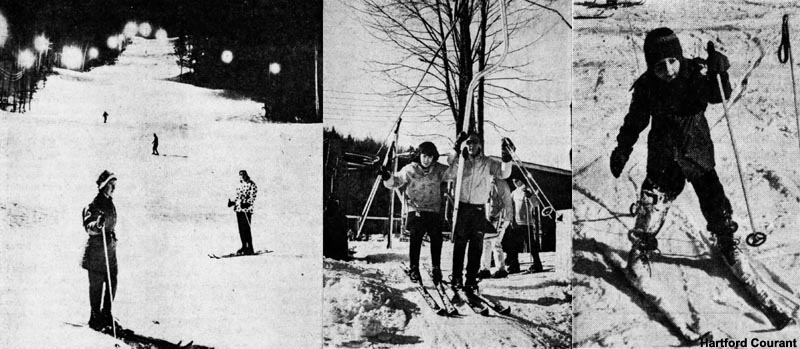
Satan's Ridge during its debut season |
Satan's Ridge finally opened on January 11, 1964, with the chairlift (with a mid-station) and rope tow serving three slopes and one trail. The Devil's Den base lodge was described as having "unique radiant heat" and a view of the slopes, though construction was not complete by opening day. Word of the new ski area spread quickly, as 1,000 cars crowded the access road during the second weekend, prompting management to request non-skiers to wait until after the season to look at the area. Frank Linnell served as general manager. The Hartford Courant described the new area as "a little bit of Vermont in your backyard." The season may have petered out at the end of February.
Long-term plans called for two chairlifts, a T-Bar, four rope tows, and additional trails and slopes of all abilities, most of which would be lit.
The chairlift was operated for sightseeing at times during the 1964 off-season.
An 800 foot rope tow was added for the 1964-65 season. Though the season may have started just before Christmas with thin lower mountain skiing, the upper mountain likely didn't open until late January. The season may have ended in late February. That spring, the IRS and the state placed liens on the property for unpaid taxes.
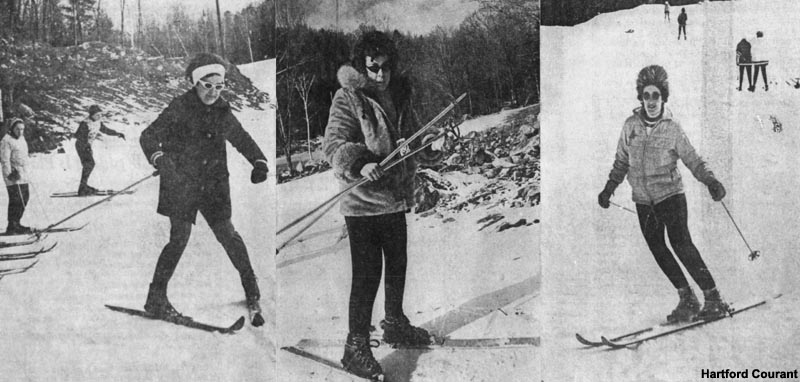
Satan's Ridge circa January 1966 |
Harold Law may have transitioned into the role of general manager for the 1965-66 season. $100,000 was invested in the mountain, including a lower mountain T-Bar serving an expanded novice area known as Wizard Hill. The Horn trail was also expanded. Skiing started the day after Christmas on manmade snow and continued to rely on it, logging 327 hours of snowmaking by mid-February. The season continued to the end of calendar winter, resulting in more skier visits than the first two seasons combined.
1966-67 improvements included a new steak house and lounge and additional trails, increasing the count to 13. The season likely got underway just before Christmas, but was hit with bad press in late January when a chair fell off the lift, injuring one. Base depths grew as the season progressed, resulting in Harold Law digging a five foot deep hole in the snow and posing with a shovel for the papers in early March. Rare April operations were achieved that season.
Closure
Paul Chichester was hired as general manager for the 1967-68 season. Formerly a ski instructor at Sugarbush, Chichester focused on improving the muddy parking lot, overhauling the lifts, and improving snowmaking. Owner Russell Smith later reflected that Satan's Ridge had "turned into a holding operation...hoping we could sell the place." A warm December likely delayed opening day until just before New Year's. The season likely continued into early March.
Following the season, United Bank & Trust Company foreclosed on Satan's Ridge. Owner Russell Smith told the Hartford Courant that the business failed because "it needed both money and management. We never got enough capital." A former employee told the paper that the area's snowmaking system was inadequate. Unable to find a buyer, the ski area sat idle during the winter of 1968-69.
Butternut to the Rescue
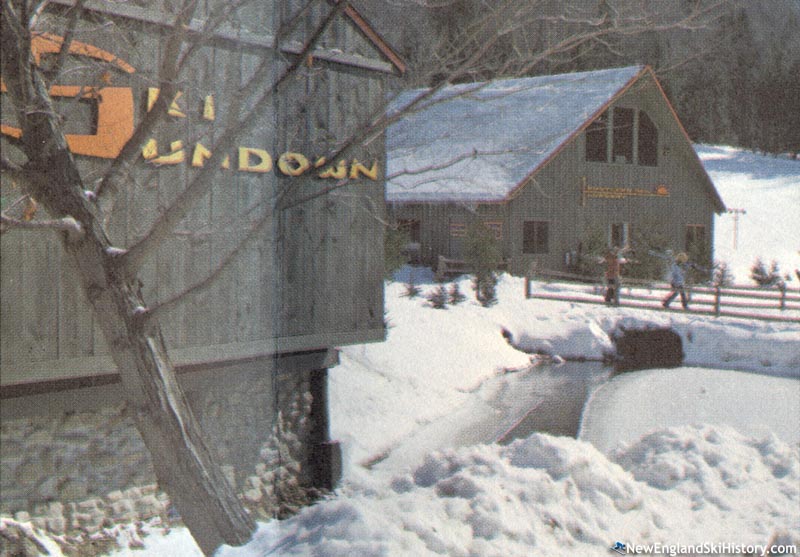
The base area circa the early 1970s |
After sitting idle for a season, the 61-acre Satan's Ridge ski area was sold by Harold Law, Russell Smith, and Frank Linnell to Channing Murdock of nearby Butternut Basin and his brother Robert Murdock in mid-1969. In September of 1969, the business was incorporated as Ski Sundown, Inc., shedding its satanic name. When Murdock's first choice for general manager was not a good fit, he recruited a 30-year old former school teacher to run the ski area. According to Richard Carter, when he started after Labor Day, the area has no electricity, drinking water, or working lifts.
The Murdocks invested over $100,000 in Ski Sundown for the debut season, including $45,000 in snowmaking improvements (the original Satan's Ridge snowmaking equipment ended up at the YMCA Camp Jewell Outdoor Center ski area in North Colebrook). Thousands of feet of six-inch snowmaking pipe was buried, while three-phase power was extended to the area. Lifts were overhauled, lighting upgraded, and the parking lots rebuilt with gravel. Operations were expanded to 7 days and 6 nights per week and Jack Harrington was named ski school director. The season likely started just before Christmas and ran through the end of calendar winter.
Ski Sundown's sophomore season saw the cutting of the novice-intermediate Tom's Trail, opening of the lift line to skiing, regrading of the beginner area, renovation of the main lodge with an expanded sun deck, and remodeling of the Rustler's Den lounge. A new ski patrol building was also constructed. Skiing likely started in mid-December.
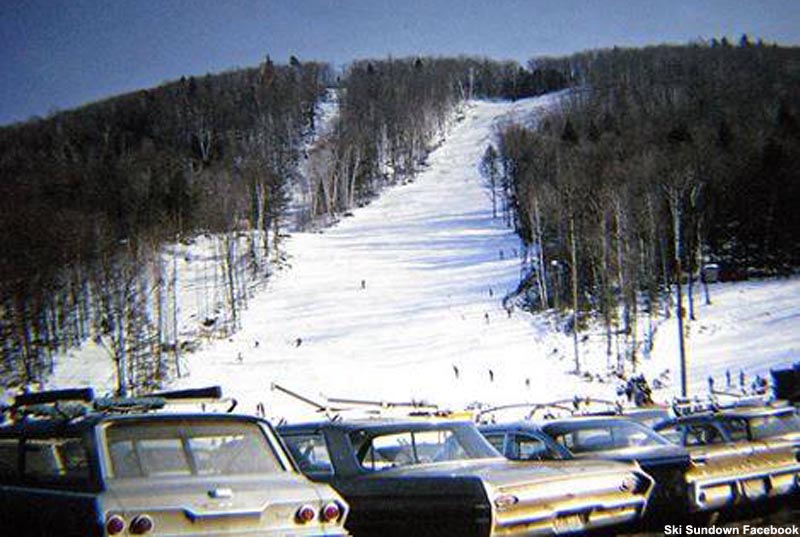
Ski Sundown |
To further enhance beginner offerings, a Pomalift was installed for the 1971-72 season. In addition, the top of Gunbarrel was reworked to alleviate a bottleneck. Hans Baumberger was named ski school director. Though the season had a rare November start, mild weather produced bare spots and hampered holiday business, with Baumberger telling the Hartford Courant that, "it just has not been cold enough for long periods of time to allow us to put down a good cover." Adding to the struggles, early on the morning of January 29, a fire destroyed all four of Ski Sundown's snowmaking compressors.
The 1972-73 season kicked off in mid-December, but soon experienced a January rollercoaster. Initial cold weather provided decent snowmaking conditions early in the month until an extended thaw resulted in a two-day closure. The season rebounded at the end of January courtesy fourteen inch snowstorm. Not much snow arrived thereafter, resulting Sundown closing after the second weekend in March with a total of 78 operating days and 23 inches of natural snowfall. General manager Rick Carter called it "the worst possible year imaginable," but managed to break even, adding, "I think we proved to ourselves that if we can get through a year like this, we can get through any situation."
Off-season activities included a beer festival and haunted house, both for the benefit of local organizations. In addition, the area reportedly quietly hosted hang-gliding activities.
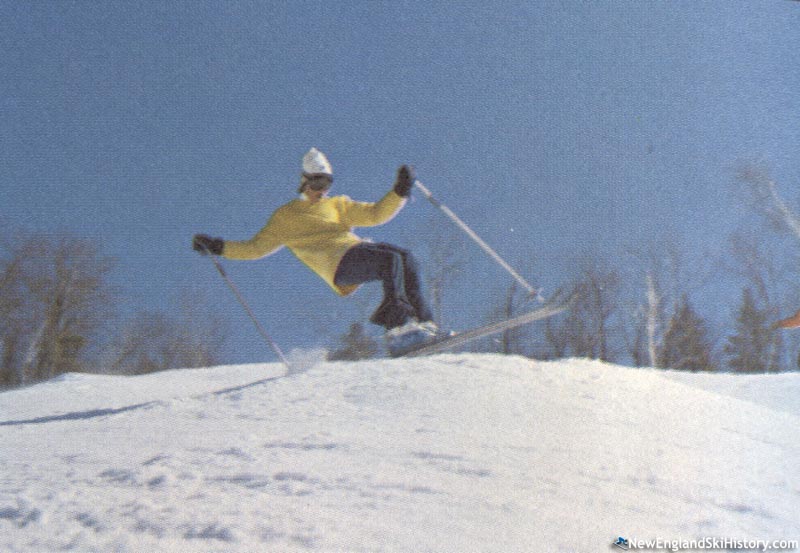
Ski Sundown in the 1970s |
Gail Appell was named ski school director in advance of the 1973-74 season. Around this time, Channing Murdock made general manager Rick Carter part owner of the ski area. Improvements for the season included renovating the Rustler's Den. Now in the midst of an energy crisis, Ski Sundown began advertising itself to beleaguered skiers as being "less than a gallon away."
The 1973-74 season likely started with lower mountain terrain a few days before Christmas. The area limped through the vacation period "with some uncovered spots." January was not much better, as warm weather pushed many skiers to local golf courses. Rick Carter lamented at the end of January that "I'm sitting here watching the melted snow run down the river."
In early February, famed freestyle skiers Wayne Wong, George Askevold, and Floyd Wilkie demonstrated their "hot dogging" skills at Ski Sundown. An estimated crowd of 3,000 showed up to watch the evening exhibition on the Gunbarrel slope. Meanwhile, continued snowmaking efforts and occasional natural snow resulted in Sundown reporting deeper base depths than many prominent areas up north. The season likely ended in early March. Despite being 28 days shorter, the 1973-74 season had a similar number of skier visits as the prior winter, leaving Ski Sundown in better shape than many other besieged areas.
One small area that was struggling was Paucatuck Ski Area in West Springfield, Massachusetts. The West Springfield YMCA constructed the ski area off Dewey Street for the 1964-65 season. Though the 150 vertical foot area grew to include four rope tows, snowmaking, and night skiing, the YMCA may have encountered financial problems in 1974. Ski Sundown owner Channing Murdock purchased the ski equipment and leased the land from the YMCA in the fall of 1974, hiring George Terwilliger away from the doomed Greylock Glen to be the manager. Murdock may have leased the ski area for a season or two before it closed for good.
Hang-Gliding
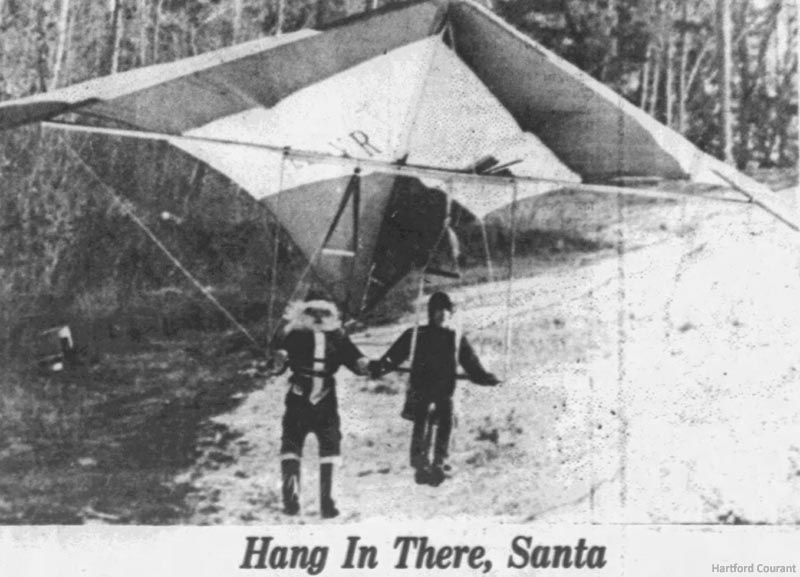
Santa Claus hang-gliding at Ski Sundown (December 1974) |
The second annual beer festival at Ski Sundown in September 1974 drew over 2,500 attendees, raising thousands for a local volunteer fire department and woman's club. In October, Sundown hosted a hang-gliding competition on the slopes, using the chairlift to transport participants up the hill. The event attracted more than 2,000 spectators. A few weeks later, the haunted house sold 1,400 tickets.
The 1974-75 season kicked off in early December and featured a unique pre-Christmas event, when Robert Cordier hang-glided down a slope dressed as Santa Claus. By the time mid-January rolled around, the season was already shaping up to be a stark contrast to recent winters, with Rick Carter telling the Hartford Courant, "It's so damn busy I'm going in circles." Momentum continued into February, with Carter stating, "You're seeing two and three years growth in one year." The season likely came to an end in mid-March.
Ski Sundown shut down its slopes for informal recreational hang-gliding in the spring of 1975 when the town of New Hartford questioned the zoning. The area subsequently received a variance from the town, which Carter sought because "Sundown needs a profitable summer activity." Following the decision, Sundown began charging hang-gliding pilots for chairlift rides and use of the slopes.
Leveraging profits from the 1974-75 season, off-season improvements included doubling its snowmaking firepower with a $60,000 fan gun system and lighting another novice trail from the top (likely Tom's Treat). Rick Carter told the Manchester Journal Inquirer, "the airless snowmakers save money and fuel" and "operate at about one-third the cost."
The area was reportedly able to have its earliest opening to-date in early December 1975 before rain shuttered operations for a couple of weeks. A subsequent snow storm ushered in a strong Christmas holiday period and a decent start to January. A late January thaw resulted in a multi-day closure, only to be rescued by a rain-to-snow storm in early February, causing Rick Carter to proclaim, "I've never seen weather like that." Warm weather arrived in late February, leaving Rick Carter to lament, "the general public just isn't interested in skiing when it's 65 degrees out." March operations were likely sporadic.
The 1976-77 season likely started a day earlier than the prior year. Thanks to good snowmaking opportunities, Sundown had three top-to-bottom trails open for Christmas weekend, which Rick Carter said was "unheard of for Christmas." Carter told the Hartford Courant, "The conditions have been simply super, and that always brings out the crowds. The two go hand-in-hand."
Even after a mid-season thaw, snow continued to fall, leading to a strong Washington's Birthday vacation week. The week started with a six-inch snow storm, drawing 1,400 skiers a day. The season extended into late March.
Triple Chairlifts
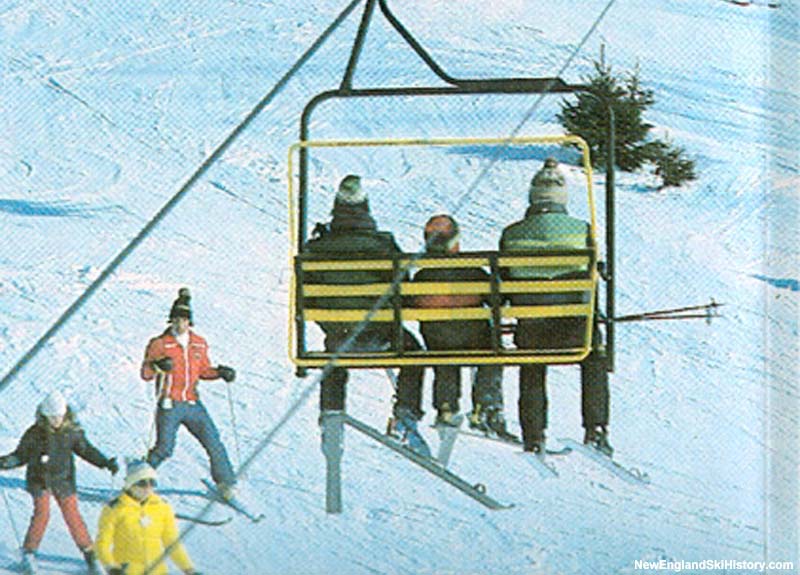
The Exhibition Triple circa the late 1970s |
Following a successful 1976-77 season in which revenue increased by 40%, Ski Sundown announced it would be installing the state's first triple chairlift as part of a $250,000 expansion. The Borvig lift was installed next to the original double chairlift, replacing the T-Bar. Other plans included a new trail, increasing the capacity of the snowmaking pond, purchasing a third Hedco snowgun, and investing $10,000 in night lighting (improving lighting on three trails and adding it to a fourth). Around this time, night skiing accounted for 40% of Ski Sundown's business, attracting 400 to 500 skiers per night, six nights per week.
The 1977-78 season likely kicked off in mid-December on limited terrain. The new triple chairlift became the area's workhorse, boosting the Sundown's uphill capacity and relegating the double chairlift to busy nights and weekends. The Blizzard of '78 hammered Sundown, with Rick Carter telling the Meriden Morning Record and Journal, "We even found evidence of a small avalanche at one spot."
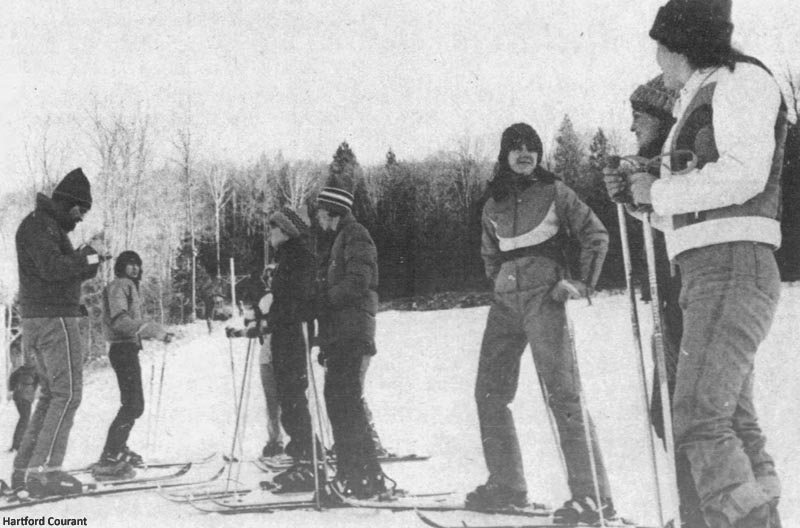
A ski school lesson (1979) |
Circa 1978, Channing Murdock transferred ownership of the area to Rick Carter. Meanwhile, liability insurance costs began to soar, with Ski Sundown's premium skyrocketing from $13,000 to $42,000. The 1978-79 season started on limited terrain in mid-December, but was interrupted by a thaw at the start of January. The season likely came to a close in mid-March after another snow-related interruption in operations.
A second triple chairlift was installed in 1980, serving the new Sunnyside novice area. Parking was improved in conjunction with the expansion. Despite the growth, the early 1980s were a struggle with minimal snow during the 1979-80 season and curtailed snowmaking due to a drought in 1980-81.
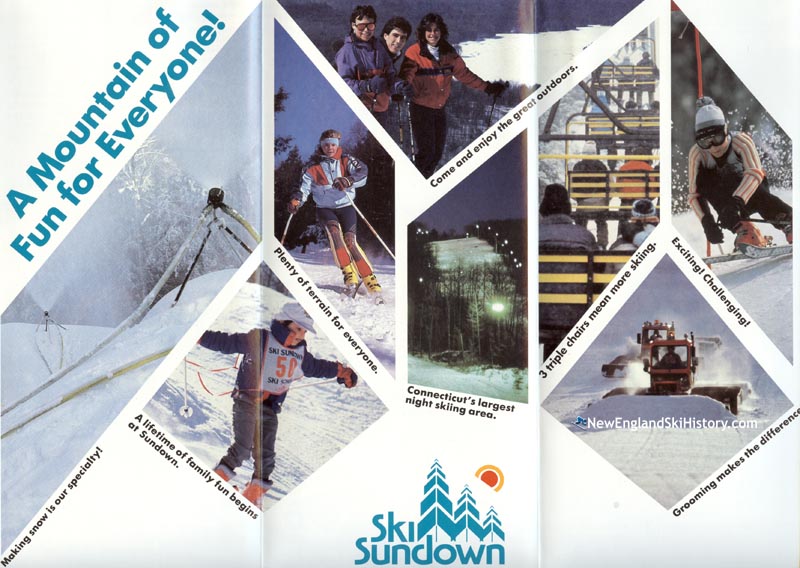
Sundown during the 1980s |
Night skiing was expanded for the 1982-83 season. The Big Bend trail was added to the Sunnyside area for the 1983-84 season, while the Papoose and Exhibition trails were regraded.
The 1986-87 season saw further improvements, including the reworking of the Temptor trail and a retrofit of the summit double chairlift. The area was blessed with natural snow that winter, with owner Richard Carter remarking, "I've never known it to be so busy."
Following the successful season, Ski Sundown kept the momentum going by replacing the double chairlift with a new CTEC triple to the summit. in addition, lighting and snowmaking were upgraded. The upgrades were greeted with a 20% increase in attendance.
The Sunnyside complex was overhauled in 1994, when the Pomalift was replaced by the refurbished double chairlift. For advanced skiers, tower snow guns were installed on Gunbarrel.
After over half a dozen years of planning, an 8,000 square foot base lodge addition was constructed for the 1996-97.
New Ownership
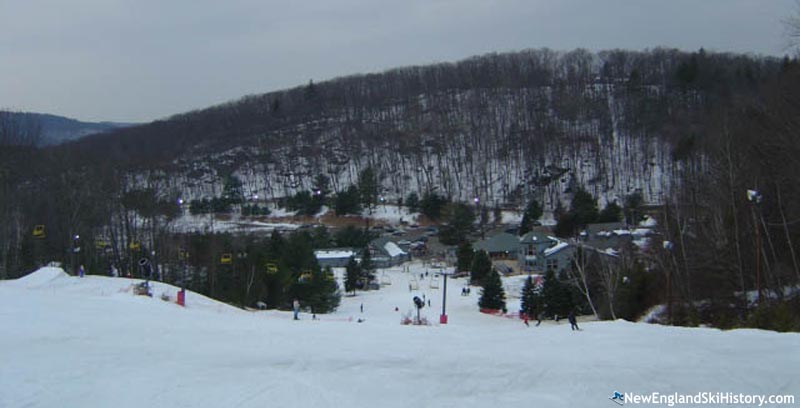
The Exhibition trail (2004) |
After owning Ski Sundown for nearly quarter of century, Richard Carter sold the area to general manager and long time employee Robert Switzgable in 2002. According to a press release, Carter chose to sell the area to Switzgable because "it's a small business and because of its unique characteristics, it is best operated by an individual who is the owner. Because I care so much about Ski Sundown, I wasn't willing to just put it on the market."
Half a decade later, Ski Sundown nearly took over the operations of Powder Ridge.
Ski Sundown's snowmaking was significantly improved in 2009 when the pump house was rebuilt. The project gave Ski Sundown the ability to make snow on all trails simultaneously.
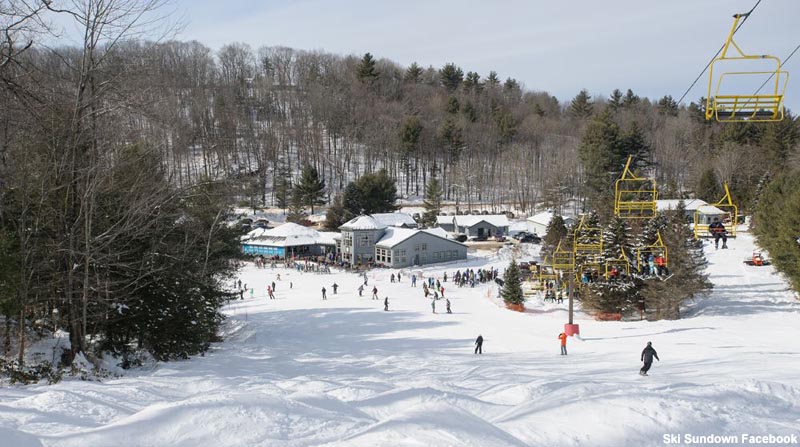
The base area (February 2014) |
The Sunnyside complex was once again overhauled in 2013, when the Little Joe Double was replaced with a conveyor lift.
Satan's Ridge co-founder Harold Law Jr. passed away on May 12, 2013 at the age of 82.
A new expert trail was added for the 2014-15 season. Named Satan's Stairway, the steep, narrow trail was equipped with snowmaking and lighting.
NewEnglandSkiConditions.com Reports
NewEnglandSkiIndustry.com News
Expansion History
Image Gallery
Lifts
Click on lift name for information and photos
Maps
Year by Year History
Adult Weekend Full Day Lift Ticket; Adult Full Price Unlimited Season Pass. Window price, including RFID fee and taxes when known.
| 2020s |
Ticket Price |
Season Pass Price |
Pass Payback |
Opening Day |
Closing Day |
Skier Visits |
| 2025-26 | $77.00 |  | $750.00 |  | 9.7 days | December 12 | | |  | | | 2024-25 | $75.00 |  | $750.00 |  | 10.0 days | December 13 | March 23 | |  | | | 2023-24 | $70.00 |  | $750.00 |  | 10.7 days | December 26 | March 24 | |  | | | 2022-23 | $68.00 |  | $725.00 |  | 10.7 days | December 26 | March 26 | |  | | | 2021-22 | $64.00 |  | $675.00 |  | 10.5 days | December 28 | March 27 | |  | | | 2020-21 | $62.00 |  | $715.00 |  | 11.5 days | December 19 | March 21 | |  | | | 2019-20 | $62.00 |  | $715.00 |  | 11.5 days | December 20 | March 8 | |  | |
| 2010s |
Ticket Price |
Season Pass Price |
Pass Payback |
Opening Day |
Closing Day |
Skier Visits |
| 2018-19 | $62.00 |  | $715.00 |  | 11.5 days | December 8 | March 24 | |  | | | 2017-18 | $62.00 |  | $650.00 |  | 10.5 days | December 21 | March 25 | |  | | | 2016-17 | $60.00 |  | $625.00 |  | 10.4 days | December 23 | March 26 | |  | | | 2015-16 | $60.00 |  | $625.00 |  | 10.4 days | January 8 | March 9 | |  | | | 2014-15 | $58.00 |  | $599.00 |  | 10.3 days | December 13 | April 2 | |  | | | 2013-14 | $56.00 |  | $589.00 |  | 10.5 days | December 13 | March 29 | |  | | | 2012-13 | $55.00 |  | $589.00 |  | 10.7 days | December 26 | April 6 | |  | | | 2011-12 | $55.00 |  | $589.00 |  | 10.7 days | December 17 | March 17 | |  | | | 2010-11 | |  | $589.00 |  | | December 10 | March 27 | |  | | | 2009-10 | $52.00 |  | $579.00 |  | 11.1 days | | March 21 | |  | |
| 2000s |
Ticket Price |
Season Pass Price |
Pass Payback |
Opening Day |
Closing Day |
Skier Visits |
| 2008-09 | $50.00 |  | $579.00 |  | 11.6 days | November 28 | March 28 | |  | | | 2007-08 | $48.00 |  | $579.00 |  | 12.1 days | | March 30 | |  | | | 2006-07 | $46.00 |  | $579.00 |  | 12.6 days | December 9 | April 1 | |  | | | 2005-06 | $43.00 |  | $549.00 |  | 12.8 days | December 3 | | |  | | | 2004-05 | $40.00 |  | $549.00 |  | 13.7 days | | | |  | | | 2003-04 | $37.00 |  | $549.00 |  | 14.8 days | December 6 | | |  | | | 2002-03 | $35.00 |  | $549.00 |  | 15.7 days | November 30 | | |  | | | 2001-02 | $34.00 |  | $499.00 |  | 14.7 days | | March 9 | |  | | | 2000-01 | $33.00 |  | $499.00 |  | 15.1 days | | | |  | | | 1999-00 | $32.00 |  | |  | | | | |  | |
| 1990s |
Ticket Price |
Season Pass Price |
Pass Payback |
Opening Day |
Closing Day |
Skier Visits |
| 1997-98 | |  | |  | | December 13 | | |  | | | 1996-97 | |  | |  | | December 22 | | |  | | | 1995-96 | |  | |  | | December 9 | | |  | | | 1994-95 | |  | |  | | December 17 | | |  | | | 1992-93 | $28.00 |  | |  | | December 11 | | |  | | | 1991-92 | $27.00 |  | |  | | December 7 | | 110,000 |  | | | 1990-91 | |  | |  | | | | 99,000 |  | | | 1989-90 | $26.00 |  | $440.00 |  | 16.9 days | | | |  | |
| 1980s |
Ticket Price |
Season Pass Price |
Pass Payback |
Opening Day |
Closing Day |
Skier Visits |
| 1988-89 | $24.00 |  | |  | | December 11 | | |  | | | 1986-87 | $20.00 |  | |  | | | | |  | | | 1985-86 | $19.00 |  | |  | | | | |  | | | 1981-82 | |  | |  | | December 13 | | |  | | | 1980-81 | $13.50 |  | |  | | | | |  | | | 1979-80 | $11.00 |  | |  | | December 21 | | |  | |
| 1970s |
Ticket Price |
Season Pass Price |
Pass Payback |
Opening Day |
Closing Day |
Skier Visits |
| 1978-79 | $10.00 |  | |  | | December 16 | March 18 | |  | | | 1977-78 | $10.00 |  | |  | | | March 26 | |  | | | 1976-77 | $9.00 |  | $150.00 |  | 16.7 days | December 4 | March 27 | |  | | | 1975-76 | $8.75 |  | |  | | December 5 | | |  | | | 1974-75 | $8.50 |  | |  | | December 7 | | |  | | | 1973-74 | $8.00 |  | |  | | | | |  | | | 1972-73 | $7.00 |  | |  | | December 15 | March 11 | |  | | | 1971-72 | $7.00 |  | $130.00 |  | 18.6 days | | March 19 | |  | | | 1970-71 | $7.00 |  | |  | | | March 28 | |  | | | 1969-70 | |  | |  | | December 19 | March 22 | |  | |
| 1960s |
Ticket Price |
Season Pass Price |
Pass Payback |
Opening Day |
Closing Day |
Skier Visits |
| 1967-68 | $6.00 |  | |  | | | | |  | | | 1966-67 | $5.00 |  | |  | | | April 2 | |  | | | 1965-66 | |  | |  | | December 26 | March 20 | 24,000 |  | | | 1964-65 | $3.50 |  | |  | | | | 10,000 |  | | | 1963-64 | |  | |  | | | | 9,000 |  | |
Visitor Memories
| "I recently discovered Ski Sundown and it has changed my life. It is a unique little mountain with excellent grooming that allows for corduroy turns every morning for the early birds. When an octogenarian expert skier who flew by me several times on runs and I rode the lift together, he told me "this place saved my life". I know what he means!
Thank you SkiSundown and Robert Switzgable!
Rudiger Breitenecker" | | Rudiger Breitenecker, Mar. 4, 2025 | | "I learned to ski at Sundown and it will always be a place to remember. I went through the JI program and the following year became a ski instructor, completing my PSIA L1 exam and making a lot of friends along the way. I will never forget Ski Sundown." | | Shirah Mark, Jan. 17, 2022 | | "I remember dollar night on Monday evening
The place was packed but great fun for a dollar
Must have been in 1972 or 1973" | | Tim Berge, Aug. 25, 2021 | | "37 years ago I got my start in the industry making snow with Bob Switzgable.What a blast! Moved to Vermont after two years. Have not made snow in eight years but I am still snow farming for Killington. I told human resources as long as I can climb in a machine I will groom forever. Thank you Ski Sundown for my awesome carrier. " | | Jay Hudson, Nov. 14, 2020 | | "I learned to ski here and feel very sentimental thinking about Ski Sundown. In the late 90's our after school ski program would make the weekly trip from West Hartford to New Hartford and we couldn't wait to return the following week. I am glad to see that this place still operates successfully and has since cut a new trail: Satan's Staircase which runs right alongside the Gunbarrel Trail. It is only moderately steep but extremely narrow, bumped up and shaded by the trees all day making for a challenging descent. It is a great place to bring the family and to teach future generations about the sport we all enjoy. Even though we have all moved on to bigger and less expensive mountains there is something about Ski Sundown that will never let me forget how special it is. " | | Rusty Shackleford, Dec. 18, 2017 | | "I was the ski director of the ski school at Ski Sundown. My wife Maurie was a ski instructor and my two sons Scott and Todd learned to ski there.
Both sons became freestyle competitors. We held a freestyle competition at Ski Sundown with Wayne Wong being a competitor." | | Jack Harrington, Apr. 4, 2017 | | "I was Ski Sundown's first female lift attendant in the winter of 1973. My brother Jeff Pratt was already working there, and my parents Rod and Hala were both on the ski patrol. A family affair, you could say. Rick Carter called the house one day to ask Jeff to come in and cover a shift and my mother said, "Jeff's not here, but Sue is." Rick replied, "Put her on." And that was my hiring!
Being the first woman to serve as a lift attendant was a responsibility I felt keenly, knowing that to complain about dragging heavy trash cans full of rain-sodden snow up the lift ramps would be the end of future women in the job. I never said a word. I think I saw this as my "gift" of sorts to the women lift attendants who would come along behind. I worked all that winter, and again the next winter during college breaks. It was a huge part of my life and meant (and still does) a great deal.
" | | Susan Pratt, Mar. 3, 2017 | | "I was a member of the freestyle team back in the 70's. Learned to ski at sundown. Great memories." | | Geoff Shea, Mar. 2, 2017 | | "I learned to ski at Satan's Ridge in the '60s and skied Sundown many nights when I was in high school. The "hill" was great part of my youth!" | | Sue Gentile, Mar. 2, 2017 |
|
External Links
Ski Sundown - official site
|
Last updated: April 2, 2024
|



